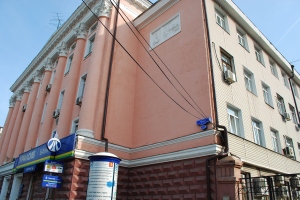I love birthdays. I think they are a wonderful excuse to feel happy (if it’s your birthday) or brighten someone’s day (if it’s someone else’s birthday).
Yesterday was my birthday, and I had an exceptionally great day. I worked for four hours in the kindergarten, went next door for a Russian class, and two hours later returned to the kindergarten for another four hours. (I think if everyone took two-hour breaks in the middle of their workday they would be happier and more productive.) My lessons went well all day; my students were (generally) attentive and affectionate; all the teachers at the kindergarten (even those who don’t speak English) expressed well-wishes in some way; the sun was shining all day and the sky was blue; and I was given a lot of chocolate.
When it was time for the kids to take their naps, I hugged each of them — the ones who drew cards for my birthday, the ones who pay attention in class every day, the ones who don’t, and even the one who, only a day earlier, had resorted to a self-defense I-don’t-know-my-own-strength-because-I’m-only-six kick to my stomach as I swooped in to scold him for yelling during naptime. (In fact, this particular student hugged me for so long that I had to actually pry him off me, the remorse clear in his serious eyes (he had just received a bit of a speech — from a Russian teacher, so he would understand everything being said — about respecting teachers and not kicking people).)
On the playground I was pushing V on the swings as usual, my arms beginning to hurt (a half-hour of pushing a five-year-old on a metal swing five times a week really adds up), when suddenly he asked me to stop and climbed off the swing. “Now you sit,” he said, and when I did he started pushing the swing, his face glowing with pride.
Earlier in the day, as the kids were preparing for naptime, K asked to look at my watch. I gave it to him, and he sat silently, watching the hands move, for ten minutes. Then I asked the kids what they thought I should do to celebrate my birthday. “You should sleep,” K said, “because then you might have a good dream.”



